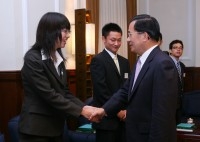President Chen Meets Delegation from Japan-Taiwan Relations Think Tank

President Chen Shui-bian on September 5 met with a delegation of Taiwan international relations experts from a Japanese think tank devoted to Taiwan and Japan relations. The president expressed his welcome to the visitors for making the trip to Taiwan and also expressed his appreciation for their long support for Taiwan.
The president said that this is the fifth time that a delegation from the think tank has visited Taiwan since 2000. President Chen said he appreciated and supported the stance by the first head of the think tank that if Japan and Taiwan are unable to resume formal relations, Japan should consider following the American model and formulate a Japanese version of the Taiwan Relations Act.
President Chen said relations between Taiwan and Japan are quite friendly. Two years ago, the Japanese government decided to extend visa-free courtesies to Taiwan tourists, paving the way for the number of people making visits between the two nations to hit a new high. Last year, a total of 2.4 million tourists from Taiwan and Japan made visits to the other. In addition, in July of this year Japan amended regulations to recognize drivers licenses issued in Taiwan. Bilateral trade last year exceeded US$60 billion. All of these factors indicate that while the two countries do not have formal diplomatic relations, the ties between the two are among the closest of any two nations in the world, he said.
President Chen said he appreciated that Japan has not expressed public opposition to Taiwan's push to hold a referendum to determine whether it should apply to enter the United Nations under the name "Taiwan." The president said this shows that Japan and Taiwan share the same values in upholding liberal democracy, which comes from having similar backgrounds. First, both countries face a threat from China, he said. In an attempt to threaten Taiwan, China has deployed nearly 1,000 missiles that are aimed at Taiwan. Meanwhile, China's military procurement budget has increased by double digits in each of the past 18 years. This is a major threat to both Taiwan and Japan, he said. Secondly, the president noted, both countries hope to become "normalized nations." This includes Japan's hope to amend its Constitution to clarify the status of its Self Defense Force. Taiwan also continues to work toward becoming a normalized country. Thirdly, the two nations hope to make contributions in the United Nations. Japan is seeking to become a permanent member of the UN Security Council, while Taiwan is hoping to become a member of the world body.
The president said that the Republic of China's membership in the UN and its position on the Security Council were taken over by the People's Republic of China. If the nation wants to become a member of the UN using the name "Republic of China," it must replace the People's Republic of China. This is not going to happen, he said. In order to enable the 23 million people of Taiwan to have an opportunity for their nation to become a new member, the country cannot use the name "Republic of China" in its application. This provides the conceptual background for the referendum for Taiwan to apply to enter the UN using the name "Taiwan." The referendum will enable the world to hear the voice and hopes of Taiwan to enter the world body, he said.